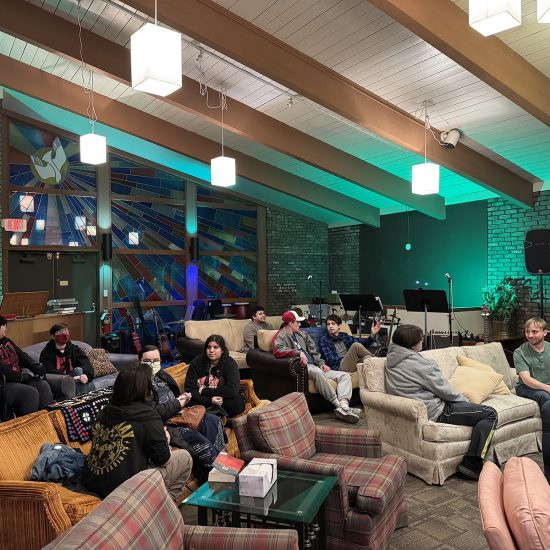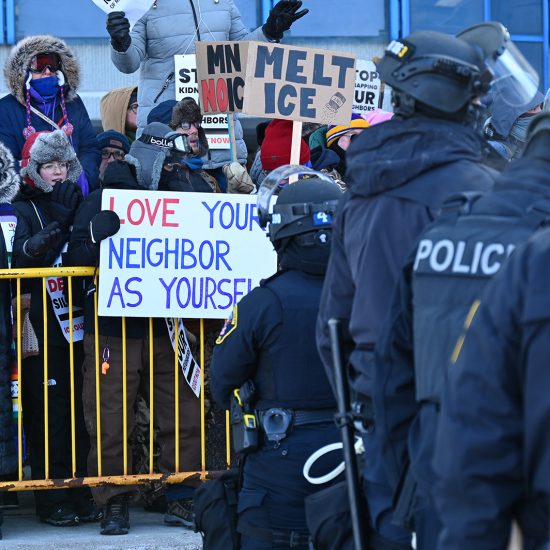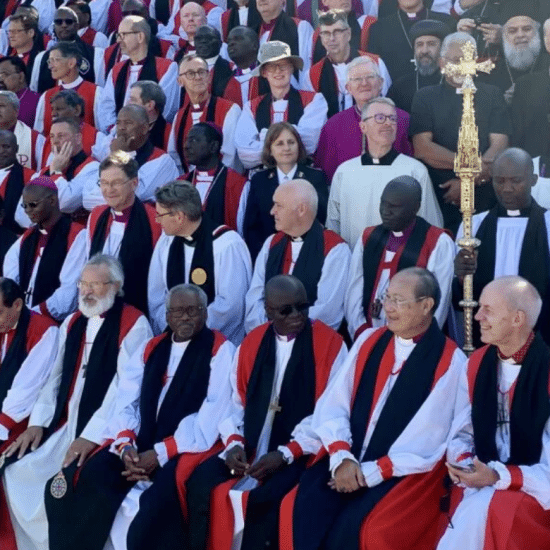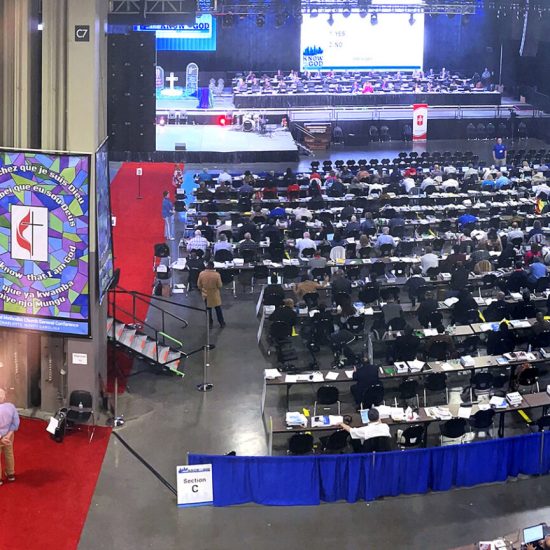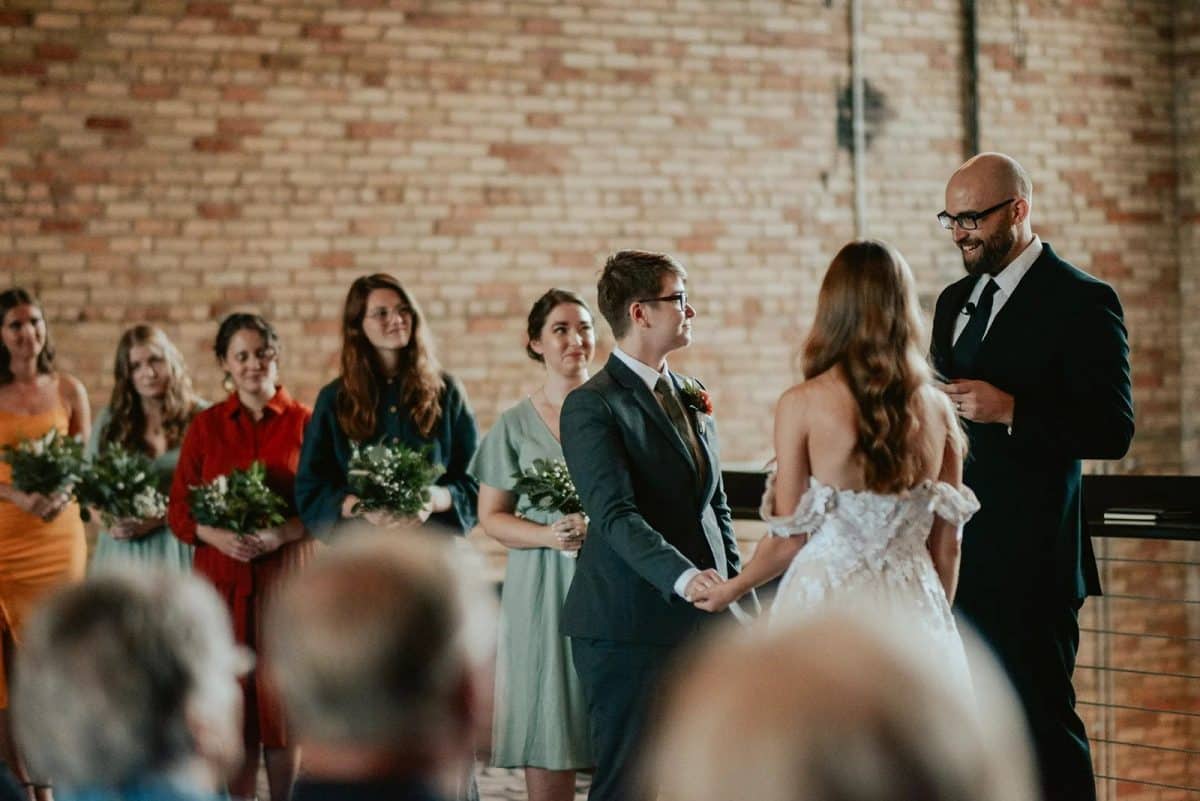
(RNS) — For years, Calvin University, a leading evangelical school in Grand Rapids, Michigan, has tried to walk a fine line of being welcoming to LGBTQ students while still enforcing traditional Christian Reformed Church views on sexuality.
The school sponsors a support group for gay students, gave an alumni award to an LGBTQ graduate and last year saw a gay undergrad elected as student body president. But after a Calvin professor officiated a wedding last fall for an LGBTQ staffer at a campus-based research center, putting both employees in violation of school policy, school leaders tried to resolve the matter quietly. The Center for Social Research, part of the school since the 1970s, was allowed to spin off and the staffer was able to stay.
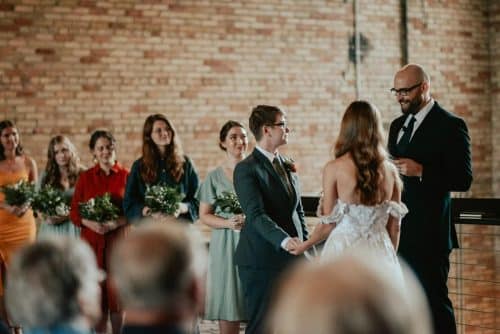
Calvin University professor Joe Kuilema (right) officiates the wedding of Nicole Sweda and Annica Steen on Oct. 15, 2021. (Religion News Service)
Things changed this last week when Chimes, the Calvin student newspaper, broke news about the reason for the split. Chimes later interviewed Nicole Sweda, the Calvin staffer whose marriage led the CRS to leave Calvin.
“I’m not going to be ashamed for being queer,” Sweda, who ultimately quit her job in order to speak openly about her wedding, said in the Chimes interview. “I’m not going to be ashamed for being married to Annica.”
The events reveal the dilemma facing many Christian schools, who want to welcome a diverse range of students to their campus while upholding their beliefs that marriage is for one man and one woman and that sex outside marriage is sinful. Striking that balance has become increasingly difficult in recent years as more and more young Americans, including students at Christian schools, identify as LGBTQ — a recent Gallup survey found that 1 in 5 Americans born between 1997 and 2003 say they are LGBT. Most younger Americans also see LGBT inclusion as a nonnegotiable, which puts them at odd with conservative older Christian leaders and evangelical institutions.
“I want Calvin to be honest,” said Sweda. “If they are going to cut ties with staff members, faculty and an entire center of over this, then just say that. And stop promoting things that make Calvin look more welcoming.”
When Sweda and Annica Steen decided to marry in the fall of 2021, they knew their wedding day would be bittersweet: Amid the celebration there would be the pain of rejection by friends and family who disapproved of their relationship on theological grounds. The couple wanted to find someone to officiate who could capture the range of emotions they were feeling. Because the wedding would be a civil ceremony, the couple was not looking for a clergyperson, but still someone they admired.
“Right away Joe came to mind,” said Sweda, referring to Joseph Kuilema, an assistant professor of sociology and social work at Calvin who had been a friend and mentor to Sweda.
Last Oct. 15, Kuilema stood with the couple in front of a gathering of family and friends and pronounced them legally married.
Things began to unravel in January when Sweda was summoned to a meeting at the provost’s office, where, according to Chimes, Sweda was told that her marriage violated university policy and that she could no longer stay at Calvin. She told Chimes, “If they had fired me that day, that would have been fine by me.”
Sweda told Religion News Service that fellow staff and supervisors were aware of the marriage. But instead of firing Sweda, the school told her it was working on an alternative solution: to spin off the Center for Social Research, which is largely self-sufficient. In February, the center, which performs surveys and other research projects for nonprofits, businesses and churches, announced plans to become independent by the end of April 2022.
Neil Carlson, director of the CRS, told Chimes the split between the school and the center was amicable.
“We still have a desire to stay in social and economic proximity with the community; it’s not a bad breakup, more of a ‘let’s just be friends,’” he said in February.
Carlson declined to speak to RNS, directing press inquiries to a Calvin spokesman. That spokesman declined to discuss personnel matters.
Provost Noah Toly did confirm that all faculty and staff, including those at the center, are required to follow the school’s employment policies, which bar sex outside of a marriage between a man and a woman. He also said that hiring managers and supervisors are required to enforce the policy.
Despite the accommodation, Sweda decided to quit her job in March because, she told RNS, she would otherwise have to keep quiet about her marriage until CSR’s departure from Calvin was completed — something she was unwilling to do.
Meanwhile, Chimes has reported that Kuilema’s contract renewal may have been delayed due to his participation in the wedding, and his future at Calvin may be in jeopardy. Though he has taught at Calvin since 2008, Kuilema, who declined a request for an interview, was denied tenure by the school’s board in 2018.
Calvin’s policies are unlikely to change. At this year’s denominational annual synod, the Christian Reformed Church is expected to approve a report from its Committee to Articulate a Foundation-laying Biblical Theology of Human Sexuality, which affirms the church’s traditional beliefs. A report approved in 2016 bans pastors and church leaders from officiating weddings of same-sex couples. That report allows church members to take part in such weddings as long as they realize that such weddings are sinful.
“Calvin is an institution of the Christian Reformed Church in North America, and our positions and policies are intended to follow its doctrines,” said Toly. “We don’t follow the doctrines of the church because we have to,” he added. “We follow the doctrines of the church because we believe that’s the right thing to do.”
Toly also confirmed that Calvin employees, both gay and straight, have left the school for violating the school’s policies. When an employee violates policy, the school would prefer to bring that employee into compliance with policy, but doing so is not always easy or possible, he said.
“Joining a community or institution almost always means inheriting positions and submitting to rules made by others, even if we don’t agree with all the rules, wouldn’t make those rules ourselves, or want to change the rule,” he said. “This need to live within a doctrinal framework and set of rules we don’t make is heightened in a confessional institution. Colleges and universities aren’t the only places where this happens, but they’re great places for students to grapple with this reality.”
Alyssa N. Rockenbach, professor of higher education at North Carolina State University, said that as acceptance of LGBT people continues to grow among evangelical students, leaders of evangelical schools will face more headaches.
“They will continue to be out of synch with their students the longer they persist in upholding policies and practices that dehumanize the LGBTQ+ community,” Rockenbach said in an email. “My greatest concern is for the LGBTQ+ students, staff, and faculty who may be harmed in religious environments that are unwelcoming and not prepared to help them thrive.”
Josh Packard, executive director of Springtide Research, said religious institutions often focus on defending their policies and beliefs and forget to listen to their students. Those students don’t always need religious leaders to agree with them, but they want to be heard and not ignored.
“One thing that is universal is that nobody likes to feel dismissed or like they’re not understood,” he said.
Packard also said that university leaders can no longer rely on their institutional authority to ensure that students or staff will abide by policies. Increasingly, he said, leaders have to convince people to follow the policies because it is the right thing to do.
Not all Calvin students or alums who disagree with the school want to break ties. Ryan Struyk, a Calvin graduate and journalist who won the school’s 2021 young alumni award, says the school’s mission still inspires him. Though he disagrees with the school’s beliefs about sexuality, he taught a journalism class as adjunct professor last spring.
“I taught my course with a robust, wholehearted Reformed Christian perspective, even though I’ve also come to a different conclusion than the university about how God calls me to live in this specific area,” he said. “I have no doubt that many LGBTQ Christians like me have much to offer Calvin and its students. We should be able to do so. Calvin’s mission still inspires me today, and my deep desire is to live out my place in that mission, no matter who I marry.”
Kelsey Coburn, former coordinator of student support and sexuality programming at Calvin, said the tensions between the university’s policies about sexuality and the reality of students’ lives made it difficult for staff to be supportive of LGBT students. While at Calvin, Coburn oversaw the Sexuality and Gender Awareness support group for LGBT students. She felt pressure to support the school’s policies, which she felt limited her ability to care for students.
“Calvin wants to present that they are more than happy to have conversations across ideological divides but the reality is that the CRC is not affirming,” she said.
Sweda said she may return to the center after it becomes independent or may find another job. Until then, Sweda and her wife plan to enjoy their first year of wedded bliss.
“I don’t think we were expecting this in our first year of marriage,” she said. “This incident isn’t going to cloud the celebration of our wedding and our marriage.”

